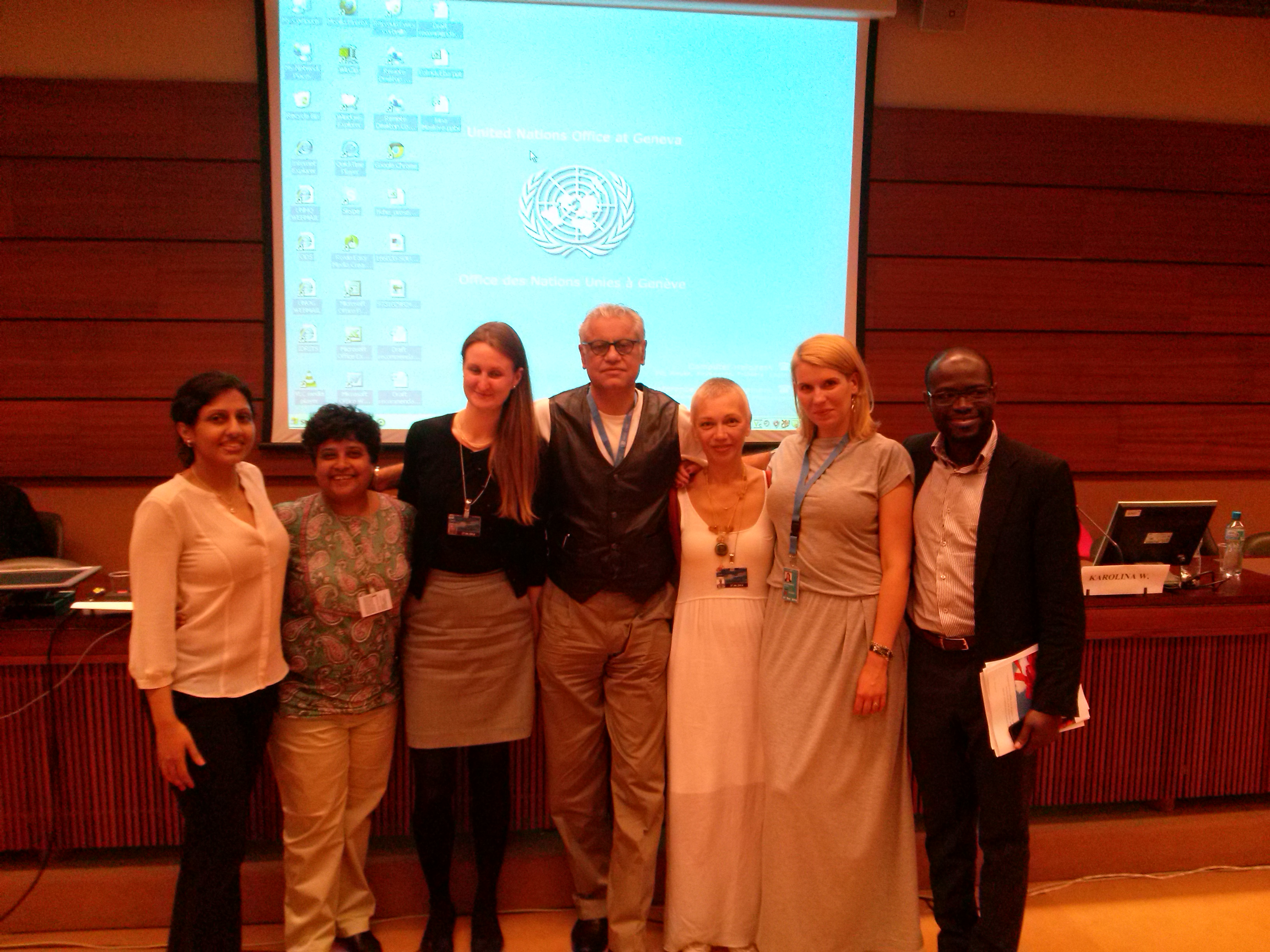SRI hosts Human Rights Council Event on the ‘Criminalization of sexuality and reproduction’
Alongside the ongoing 26th session of the Council, the Sexual Rights Initiative, in partnership with, Ipas, Amnesty International and UNAIDS, hosted a parallel event examining the interplay of the criminalization of sexuality and reproduction with the international human rights framework. Topics of discussion included the ways criminalization of different aspects of sexuality relates to control over one’s choices, restriction on autonomy and disregard for consent. Panelists explored these issues through an intersectional lens to enable a discussion of effective and rights‐based strategies to restore the control of every person over their sexuality, body and life.
Welcome remarks were provided by Neha Sood (9s.), representing the Sexual Rights Initiative and Action Canada for Population and Development. The event was moderated by Anand Grover (1h20m8s), human rights lawyer and the UN Special Rapporteur on the right of everyone to the enjoyment of the highest attainable standard of physical and mental health.

Panelists included:
- Grace Wilentz, YouAct (European Network on Sexual and Reproductive Rights), (1m41s), discussing laws relating to age of consent to sexual activity, raised the issue of disparities between laws pertaining to heterosexual individuals and to LBGT individuals, the criminalization of sexual activity between individuals with disabilities (and the failure to recognize these individuals’ right to fully express their sexualities) and comprehensive sexuality education as an effective strategy for empowering young people with the skills and information to negotiate safe sex, establish boundaries and live healthy relationships.
- Karolina Wieckiewicz, the Sexual Rights Initiative & the Polish Federation for Women and Family Planning, (8m18s), discussing the criminalisation of abortion and contraceptive use, explored the criminalization of abortion in Poland, emphasizing that the criminalization of abortion services does not lead to a decrease in the number of abortions but rather puts women at greater risk of experiencing stigma, discrimination and negative health outcomes, often associated with unsafe abortion. Ms. Wieckiewicz demonstrated the correlation between the criminalization of abortion and the perpetuation of systematic gender-based violence and discrimination.
- Irina Maslova, Sex Workers’ Rights Advocacy Network (SWAN) & Silver Rose, (15m34s), discussing the criminalisation of sex work, explored the negative impacts associated with such criminalization, including violations of the right to health, freedom to live free from violence and discrimination, freedom of expression, privacy, among other human rights. Examples of the human rights violations experienced by sex workers in contexts where sex work is criminalized include forced HIV testing and violence perpetuated by police officials. Ms. Maslova identified strategies to decriminalize sex work and overcome the negative impacts of criminalization, including the use of regional and international human rights mechanisms for further legal resource when national remedies have been exhausted, documenting violence and abuse experienced by sex workers and providing free legal services to sex workers.
- Sunita Kujur, the Sexual Rights Initiative & CREA, (25m02s), discussing criminal laws relating to sexual activity, identified the intersections between punitive laws on the grounds of gender expression and social approval/disapproval, which are often grounded in perceptions of culture and tradition. Ms. Kujur also addressed the impacts of laws surrounding sexual activity ‘outside of marriage,’ vis-à-vis women’s right to inheritance and property, and the reality that such laws often do not have legal bearing but are socially sanctioned.
- Patrick Eba, the Joint United Nations Programme on HIV/AIDS (UNAIDS), (31m30s), presented case studies from countries around the world where the transmission, non-disclosure and exposure of HIV is criminalized, and the associated human rights violations. Mr. Eba highlighted that in most countries where the transmission of HIV is criminalized, legislation fails to recognized scientific evidence regarding the transmission of HIV and the basic principle of criminal law (which, in this case, requires proof of the origin of the transmission). In many cases such legislation also unjustly prosecutes marginalized populations, including sex workers. It is therefore critical to develop and share relevant prosecutorial guidelines based on international human rights standards.
During the discussion period, attendees identified and explored areas of contradiction and commonality for further collaborative advocacy. Examples of issues discussed include the application of age of consent laws in cases where one party is under the age of consent and the other above, contradictions between laws, legal norms and standards and dominant societal views surrounding issues of sexuality and reproduction, and viewing stigma as a cross-cutting issue and strategy to facilitate legal and social change.
Mr. Grover concluded the event, recognizing that the impacts of the criminalization of sexuality and reproduction are experienced at the level of the individual. When empowered with respect for their autonomy and agency, affected individuals and their communities are best placed to identify solutions. Looking ahead, Mr. Grover expressed that it is critical that these issues remain on the agendas of the Human Rights Council and General Assembly.
(A written transcript of the remarks can be accessed here.)